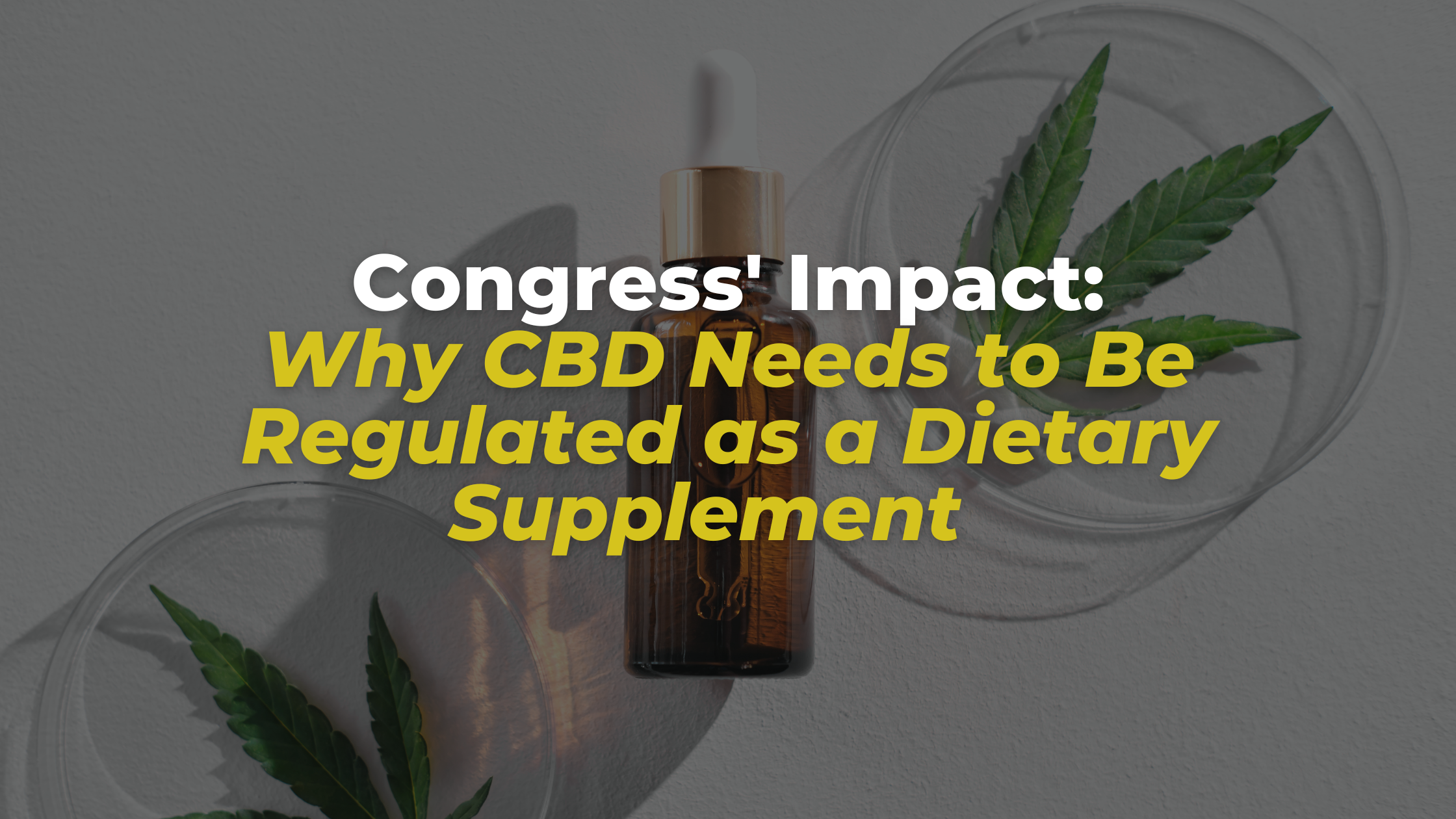
Congress' Impact: Why CBD Needs to Be Regulated as a Dietary Supplement
The demand for natural health and wellness alternatives is surging, with Cannabidiol (CBD) rapidly gaining popularity as a go-to remedy for everything from chronic pain to anxiety. However, while consumer interest in CBD continues to climb, the regulatory landscape for these products remains inconsistent and fragmented. This gap has left businesses, consumers, and the industry as a whole exposed to confusion and risks.
This is why H.R.1629, a bill under consideration by Congress, holds such great potential. By advocating for clear federal regulations to classify CBD as a dietary supplement, H.R.1629 promises to establish long-overdue standards for safety, quality, and accessibility. If passed, this bill could be a game-changer for the CBD industry and a crucial step forward for consumer protection. Here’s why it matters—and why Congress must take action now.
What Does H.R.1629 Aim to Achieve?
H.R.1629 is more than a policy initiative; it's an opportunity to bring much-needed clarity and structure to the rapidly growing CBD market. Here’s what this legislation sets out to do:
- Provide a Reliable Regulatory Framework: By classifying CBD as a dietary supplement, the bill ensures that products are held to consistent quality and safety standards.
- Promote Accurate Labeling: Consumers will gain access to CBD products with clear, accurate, and transparent ingredient lists and dosage information.
- Foster Innovation and Economic Growth: Setting federal standards will encourage investment in the CBD industry, leading to growth opportunities, job creation, and economic development.
- Build Consumer Trust: Regulatory oversight can boost consumer confidence and increase access to safe CBD products for those seeking natural health remedies.
Without H.R.1629, the industry risks remaining a patchwork of conflicting state regulations, making it harder for both businesses and consumers to thrive.
Why H.R.1629 is a Win for Both Consumers and Businesses
1. Enhancing Consumer Safety and Confidence
Imagine buying a CBD product to manage chronic pain or reduce stress, only to discover it contains harmful contaminants or misleading ingredient claims. Right now, this isn’t just hypothetical—it’s a reality for some consumers due to the lack of robust federal standards.
H.R.1629 changes the game by mandating high safety, labeling, and marketing standards. Take Sarah, for example—a patient using CBD oil to manage chronic arthritis pain. For her, reliable access to safe, accurately labeled CBD products is more than a convenience—it’s a necessity. By regulating CBD as a dietary supplement, H.R.1629 directly addresses these needs.
2. Empowering Industry Growth
For many CBD companies, the fragmented regulatory landscape is an operational nightmare. A prime example is BrightLeaf Naturals, a small CBD manufacturer operating in multiple states. With each state enforcing different rules for production, labeling, and sales, BrightLeaf has struggled to scale its operations and compete with larger brands.
Federal regulation under H.R.1629 would remove these hurdles. By introducing uniform guidelines, businesses like BrightLeaf could focus on innovation, quality, and expansion rather than navigating a maze of inconsistent state requirements. This shift would not only benefit individual companies but also set the stage for the CBD industry to reach its economic potential.
3. Unlocking Economic Opportunities
H.R.1629 is also a catalyst for economic growth. The U.S. hemp-derived CBD market was valued at $5.3 billion in 2021, and it's projected to grow exponentially in the coming years. Federal regulation would create a stable environment for investment, enabling new businesses to emerge and encouraging existing ones to expand.
Countries like Canada and Germany have already implemented effective CBD regulations, serving as global benchmarks. These markets show how a structured regulatory framework can lead to consistent growth while ensuring public safety—a roadmap the U.S. can and should follow.
The Urgent Case for Action by Congress
This isn’t just about improving product labels. It’s about ensuring that a substantial segment of the population—those relying on CBD for better health and wellness—has access to reliable, high-quality products without unnecessary risks. It’s about giving legitimate businesses the clarity they need to invest and expand confidently. And it's about safeguarding America's position as a leader in innovation, especially in growing sectors of the economy.
If Congress fails to act on H.R.1629, we risk losing the momentum of this burgeoning industry. Without federal regulation, the CBD market will remain a Wild West, marked by uncertainty, inequity, and diminished trust.
How You Can Support H.R.1629
Legislation doesn’t happen without advocacy. If you care about CBD wellness or work in the industry, here are ways you can support this vital initiative:
- Write or call your local Congress representative to express your support for H.R.1629.
- Share your CBD story on social media, detailing how this bill could positively impact your life or business.
- Partner with organizations like the Florida Healthy Alternatives Association to amplify advocacy efforts.
Together, We Can Shape the Future of CBD
Passing H.R.1629 is more than the right thing to do—it’s urgently necessary for the safety of consumers, the success of businesses, and the growth of an innovative industry. By advocating for its passage, we’re not just supporting regulatory clarity. We’re championing a smarter, healthier future.
Take action today—urging Congress to pass H.R.1629 could transform how America consumes and benefits from CBD, one step at a time.




